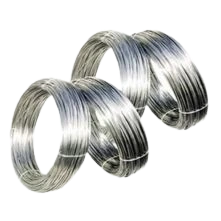Get A Quote
BIS Certification for Stainless Steel Wires IS 6528:1995

The BIS
Certification for Stainless Steel Wires IS 6528:1995 certifies adherence to the
requisite Indian safety and quality standards. This certification is essential
for manufacturers and suppliers to confirm product reliability, resistance to
corrosion, and longevity. The process entails comprehensive testing and
evaluation to ensure alignment with IS 6528:1995 specifications.
Securing BIS Certification for Stainless Steel Wires (IS 6528:1995) significantly boosts market reputation and guarantees compliance with regulatory mandates. We offer expert consulting services to facilitate the certification process, assisting businesses in achieving effortless approval while fulfilling all necessary standards for manufacturing and distribution in the Indian market.
Introduction
The BIS
Certification for Stainless Steel Wires IS 6528:1995 assures compliance with
the quality and safety standards outlined in the Steel & Steel Products
(Quality Control) Order, 2024. This certification is vital for manufacturers
and importers to adhere to regulatory requirements and bolster their market
credibility. It confirms that stainless steel wires meet critical standards for
performance, durability, and reliability. The BIS Certification for Stainless
Steel Wires IS 6528:1995 is fundamental for facilitating trade, ensuring
consumer safety, and promoting industry compliance, making it an essential
requirement for enterprises engaged in stainless steel wire products.
Why is BIS Certification necessary for Stainless Steel
Wires IS 6528:1995?
Obtaining BIS
Certification for Stainless Steel Wires IS 6528:1995 is crucial for ensuring
product quality, safety, and compliance with Indian standards. This
certification ensures that the wires conform to the required mechanical and
chemical properties, thereby enhancing durability and performance. It is a
prerequisite for manufacturers and distributors to establish market credibility
and foster consumer trust. Additionally, it streamlines the regulatory approval
process and helps avoid legal issues. By securing BIS Certification for
Stainless Steel Wires IS 6528:1995, organizations can demonstrate compliance
with industry standards, thereby increasing their competitiveness in the Indian
marketplace.
Overview of Indian Standard IS 6528:1995
The IS 6528:1995 standard outlines the quality, mechanical attributes, and assessment methodologies for stainless steel wires utilized in diverse industrial applications. This standard guarantees that the wires fulfill the necessary durability, corrosion resistance, and strength criteria. Its implementation is vital for ensuring product reliability and safety.
BIS Certification
for Stainless Steel Wires as per IS 6528:1995 is imperative for manufacturers
to adhere to regulatory standards and to market their products legally within
India. This certification serves as a guarantee of quality, strengthens
customer confidence, and aids in the smoother acceptance of stainless steel
wire products in the marketplace.
Process for BIS Certification
The BIS certification process for Stainless Steel Wires IS
6528:1995 involves multiple steps designed to thoroughly evaluate a product's
compliance with the required standards. Here is a general overview of the
certification process:
1. Application Submission:
Manufacturers must submit an application form along with the required
documentation to BIS.
2. Documentation Review: BIS
reviews the submitted documents to ensure completeness and correctness.
3. Factory Inspection: BIS
officials conduct an on-site inspection of the manufacturing facility to assess
the production process and quality control measures.
4. Sample Testing: Product samples
are taken and tested in BIS-approved laboratories to verify compliance with
Indian standards.
5. Certification Grant: Upon
successful completion of the inspection and testing, BIS grants certification,
allowing the manufacturer to use the BIS mark on their products.
Documents Required for BIS Certification
To apply for BIS certification, manufacturers need to submit the following documents:
● Application form
● Manufacturing process details
● Quality control plan
● Test reports from BIS-approved laboratories
● Factory layout and equipment details
● Proof of business registration
● Product specifications and technical details
● Declaration of conformity to Indian standards
Additionally, manufacturers may be required to provide proof of compliance with environmental and safety regulations, depending on the specific type of product being certified.
BIS ISI Mark Certification Costing And Timeline
To Know The Process in Detail, Please Visit:
Under BIS Registration Products ISI and CRS
Conclusion
Acquiring BIS
Certification for Stainless Steel Wires IS 6528:1995 is essential for adhering
to Indian quality and safety standards. This certification ensures that
stainless steel wires conform to the necessary specifications for durability,
strength, and performance, thus rendering them suitable for a multitude of
industrial applications. At EVTL India, we specialize in assisting
manufacturers throughout the BIS certification journey with our expert
consultancy services, guaranteeing a seamless and efficient approval process.
Our team offers comprehensive support, covering everything from documentation
to product testing, to ensure compliance with IS 6528:1995. With our expertise,
businesses can confidently promote their products while fulfilling regulatory
obligations. By securing BIS Certification for Stainless Steel Wires IS
6528:1995, manufacturers can bolster product credibility, broaden market
access, and foster customer trust. Rely on EVTL India for professional
consultancy services that simplify the certification procedure, ensuring your
stainless steel wires meet the highest industry standards for quality and
reliability.
Free Call Back
Latest News & Update
📅 BIS Critical Component List (CCL) Updates for Solar PV Modules
🕒 BIS Fee Concessions for MSMEs and Startups | EVTL India
📅 Guidelines for Implementation of Essential Requirements for Security of CCTV
🕒 Omnibus Technical Regulation (OTR) Amendment Order, 2025
🕒 Extension of Timeline for Filing Annual Returns by Battery Producers
📅 Extension of Timeline for Filing Quarterly and Annual Returns for E-Waste
🕒 Extension of Concurrent Running Period for IS 302-1: 2008 and IS 302 (Part 1): 2024
🕒 BIS Guidelines for Grant of Licence (GoL) | EVTL India
📅 CPCB Guidance on filing of Application, Fees and more
🕒 CPCB Notification on Labelling of Plastic Packaging
📅 Mandatory Compliance for Input Materials of Steel and Steel Products for Imports
🕒 BIS Guidelines for Scheme-X Certification for OTR-Regulated Products
📅 BIS Upgrades Product Certification License Numbers to 10-Digit Series
🕒 BIS Certification No Longer Mandatory for 14 Chemical & Polymer Categories
Why Choose EVTL INDIA
Expertise in Indian Regulatory Standards
End-to-End Support
Trusted by Top Indian & Global Brands
Fast Processing & Transparent Pricing
Strong Liaison with Indian Authorities
Company Profile














